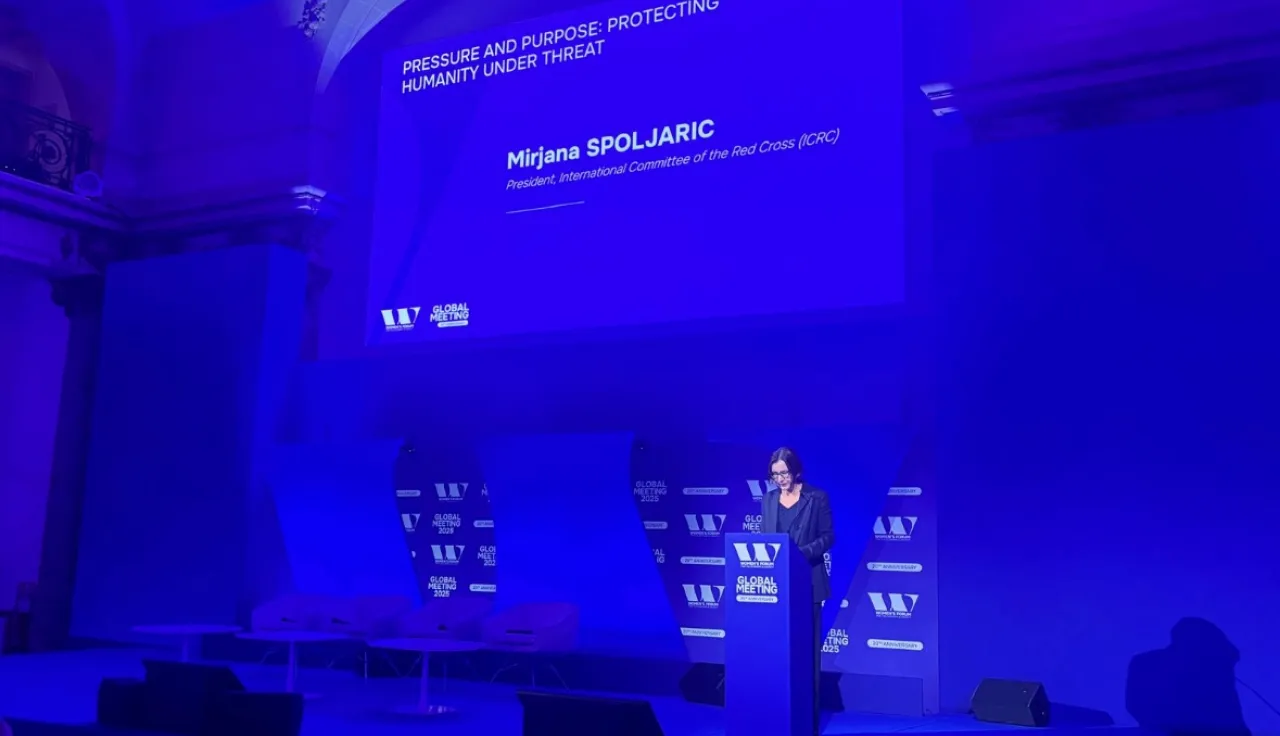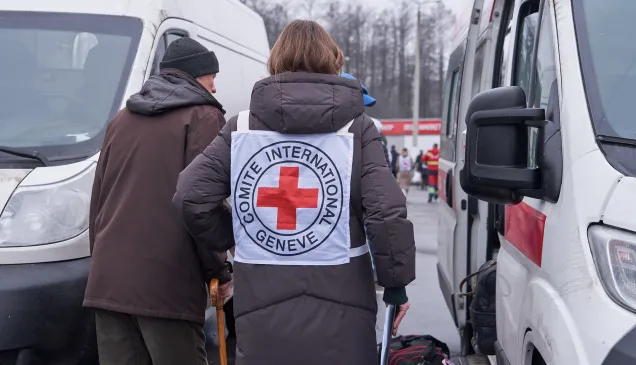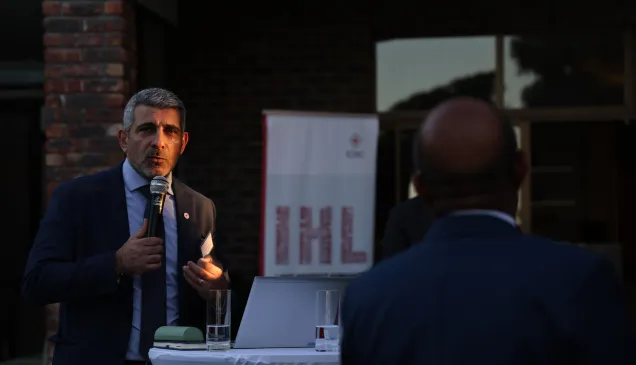Dear colleagues and friends,
I am happy to be with you today at the Women's Forum for the Economy and Society, a gathering that celebrates courage, leadership and the determination to shape a better world.
I speak to you as the president of an organization that for more than 160 years has worked in some of the most dangerous places imaginable: war zones, areas under the control of armed groups, and places where the rule of law has collapsed, and human dignity itself is disregarded.
In such places, pressure is real. It stems from the weight of decisions that can determine whether someone lives or dies. It is the responsibility of negotiating with those in power and with weapons to open safe passages for civilians. It means visiting detention facilities and enduring the personal strain of not being able to speak up in public. It is the weight of the hopes of thousands of people who believe you and your organization can deliver. And when we deliver, we often do so against enormous odds.
Today, I want to share what I have learned in the last three years about navigating such pressure; not from theory, but from time spent close to those who suffer most in conflict.
What we need to understand: we are living in a decade defined by war. The ICRC is currently classifying around 130 armed conflicts worldwide, this is more than twice as many as 15 years ago. These conflicts are not confined to borders. They spill into neighbouring countries, disrupt global supply chains, fuel displacement, and tear at the social fabric of entire communities and countries. Conflicts today are fought with new technologies.
At the same time, the political will to bring conflicts to an end has been weakened. Political will in this decade of war seems frustratingly often absent.
We have seen Palestinians and Israelis killed in their homes, and in Gaza, civilians come under fire in hospitals and while searching for food and water.
In Sudan, civilians today are enduring unthinkable horror and even those who risk their lives to help are being killed.
In Ukraine and Russia, we have registered more than 170,000 people missing until now, each name representing a child, a brother, sister, son, father or mother.
In Myanmar, restrictions on movement and persistent violence leave millions without access to even the most basic health service.
The mistreatment and disappearances of detainees and the horrific suffering imposed on civilians cannot be justified under any legal, political or moral framework.
Working in such adverse environments demands three things: clarity of purpose, the courage to remain principled, and the strength to continue when hope feels very distant.
First, clarity of purpose. When chaos surrounds you and when political divides, economic interests, and social media campaigns try to pull you in every direction, you must know why you are there. For the ICRC, that purpose is simple but profound: to help victims in armed conflict through neutral and independent humanitarian action.
That clarity is not only institutional; it is also deeply personal. Every ICRC staff member knows their work serves a single goal: to preserve human dignity amid the chaos of war. In high-pressure situations, clarity over what we stand for is the compass that keeps us going and keeps us steady when everything else is uncertain.
Second, the courage to remain true to the ICRC’s principle of neutrality. Neutrality – and I felt this personally – is often misunderstood and very often portrayed as weakness or moral ambiguity. But our neutrality is humanitarian, and it is far from indifference.
Thanks to our unwavering impartiality and independence, parties to conflict give us a license to operate close to and across front lines, to speak to all parties to a conflict, and to reach people in territories under the control of militaries and armed groups.
It takes courage to sit at the table with those the world condemns. It supports our core principle of humanity. This is the only way to reach people everywhere. It supports our core principle of humanity, which requires us to treat everyone equally and provide help based on need, regardless of people’s affiliations or beliefs.
Third, resilience when hope feels distant. High-pressure environments test not only your ability to act, but your ability to endure. In Syria, tens of thousands of people are missing as a result of over a decade of war. In Afghanistan, civilians continue to be injured or killed by mines left from protracted conflict.
Faced with such scale and duration of suffering, people regularly ask me: what gives you hope? For me, it is the belief that, even and especially in the grimmest of circumstances, humanity must prevail.
Every human life is a human life which deserves equal protection. Reuniting even one person with their family makes every effort meaningful. A single message from a detained soldier to his mother can bring immense relief. Ensuring a family can lay a loved one to rest with dignity is always a cause worth negotiating for.
Since 7 October 2023, the ICRC has facilitated the release of 160 living hostages and 3,472 living Palestinian detainees.
Between Russia and Ukraine, we have facilitated the repatriation of fallen soldiers on many occasions and have visited thousands of prisoners of war.
These are not simply examples where the laws of war are either upheld or ignored; they are moments of profound human reconnection for everyone involved, including for ourselves. Examples that remind us that compassion and adherence to the law can still break through the horrors of war.
We never meet all prisoners that we should be allowed to visit. Because too many detainees in too many situations of armed conflict remain stripped of the fundamental rights designed to protect them as humans at all times.
Human suffering caused by armed conflicts has many faces. Under humanitarian law, discrimination based on race, colour, gender, religion or wealth is prohibited. The same protections apply to all civilians and those no longer taking part in the fighting.
The truth is, however, that we see first-hand how women are disproportionately affected by conflict.
Gender equality is not only a moral imperative, but also a foundation of peace and stability. When states apply international humanitarian law faithfully, they protect their populations from unfair and unlawful harm.
Women are half of that population. Where a human life is a human life, where there are no double standards, women control assets equally with men. Where women participate meaningfully in decision-making, societies are stronger, and economies more resilient. We know that.
The theme of this year's forum is courage.
We’ve heard it just before. Courage is not the absence of fear; it is choosing to stand up and to act despite adversity. Courage is negotiating with a commander to allow a food convoy through. Courage is to wait at a checkpoint for endless hours.
Courage is maintaining faith in the protective power of the law even when your own constitution and universally ratified treaties are being hollowed out or deliberately dismissed.
High-pressure environments reveal something extraordinary. I have seen and experienced this myself. Our capacity to choose humanity, to believe in the good, even when everything around us argues against it.
Today we are at a point where the world is looking for moral leadership.
Moral leadership begins with recognizing that all human beings are equal.
Protecting hospitals is not weakness. Shielding civilians is not weakness. Allowing aid to reach those in need is not weakness. Treating detainees humanely is not weakness.
Upholding international treaties that were established on the rubble of the Second World War is courageous.
We all face pressure. Power does not lie in authority itself, but in how we use it.
At the ICRC, working under intense pressure means knowing your purpose, staying true to your principles, and finding the strength to keep going.
Because we believe that human nature, at its core, is ultimately good. History has shown over and over again that people protect themselves best by recognizing that the other deserves equal rights and respect for their human dignity.
I thank you.




